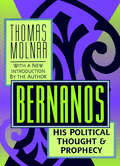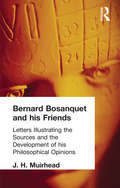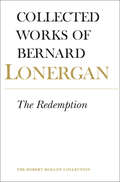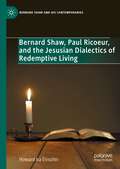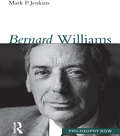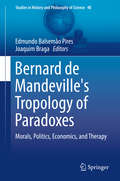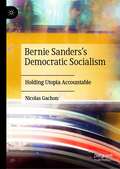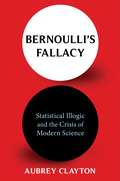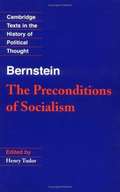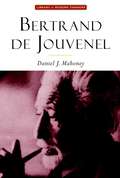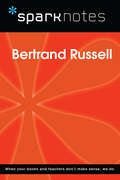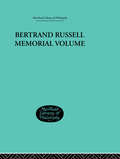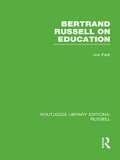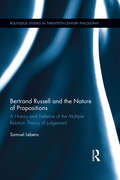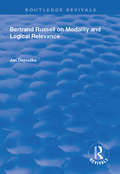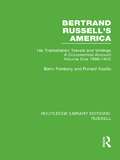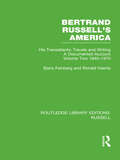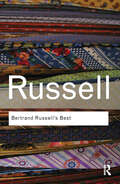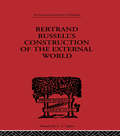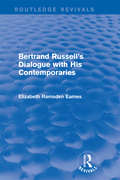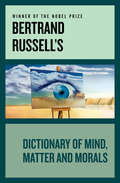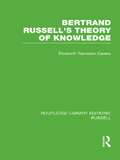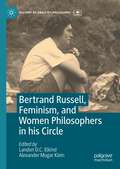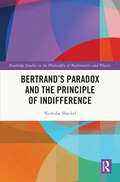- Table View
- List View
Bernanos: His Political Thought and Prophecy
by Thomas MolnarThomas Molnar's Bernanos is an illuminating study of the personal evolution of the French Catholic novelist Georges Bernanos from a reactionary royalist to a religiously principled anti-fascist. It also provides a detailed account of the intellectual divisions within the French Catholic Right and suggests a number of parallels with intellectual and literary figures on the secular and religious left including Zola, Peguy, and Simone Weil. But, as Molnar points out, the significance of Bernanos is not exhausted by his writings. Bernanos the man is as deserving of attention as is Bernanos the novelist, essayist, and social critic.Molnar shows Bernanos against the troubled political-religious background of modern France: the Dreyfus case, the disillusionment following World War I, the Franco regime, Vichy, and the beginnings of the cold war. Whatever touched France touched Bernanos, and he flung himself into each crisis, not armed with a political system nor an academically sanctioned philosophy, but with a peasant's respect for what is and a Christian's sense of what might be. The portrait that Molnar draws is that of a passionately concerned Christian who knows that truth is hard to come by, but who is ready to follow it wherever it leads, regardless of the consequences.A crucial theme covered by Molnar is Bernanos' long and conflicted relations with Charles Maurras and the Action Francaise. He makes clear the extent to which Bernanos' fervent Catholicism set him apart from Maurras whose positivistic inspiration and passion for order helped lay the groundwork for the political collapse that led to the Vichy regime. Thomas Molnar's book is a fascinating account of Georges Bernanos' stature as both a political thinker and an important novelist. Bernanos will be enjoyed by historians, political scientists, philosophers, theologians, and scholars of literature.
Bernard Bosanquet and his Friends: Letters Illustrating the Sources and the Development of his Philosophical Opinions
by J. H. MuirheadThis is Volume XIX of twenty-two in a collection on 20th Century Philosophy. Originally published in 1935, and makes enquiries into the surviving letters of Bosanquet in order to analyse his philosophical opinions.
Bernard Lonergan: The Redemption, Volume 9 (Collected Works of Bernard Lonergan #9)
by Bernard Lonergan Robert Doran, S.J. H. Daniel Monsour Jeremy WilkinsThematically focused on the theology of redemption or what is called in theology "soteriology," each of the two sections of The Redemption addresses biblical literature and significant moments in the history of Christian theology, and especially the work of Anselm of Canterbury. The second part of the book presents a significant treatment of the problem of good and evil, and introduces the important category of cultural evil. Most significant from the standpoint of Lonergan's original contribution is the treatment accorded in both Part 1 and Part 2 to what he calls "the just and mysterious law of the cross." The treatment of biblical literature contains a valuable distinction between "redemption as end" and "redemption as medium." Beginning with theses 15-17 from Lonergan's Collected Works, The Incarnate Word, this volume also includes rare and never-before-published texts originally written in the late 1950s.
Bernard Shaw, Paul Ricoeur, and the Jesusian Dialectics of Redemptive Living (Bernard Shaw and His Contemporaries)
by Howard Ira EinsohnThis book explores a heretofore unremarked linkage between Bernard Shaw, the twentieth-century French thinker Paul Ricoeur, and Jesus of Nazareth. The ties that bind them are a foundational interest in the social teachings of the Nazarene and their use of a shared dialectics with respect to living the kind of compassionate life that holds out the promise in our contemporary world of achieving something approximating universal wellness on a healthy planet at peace with itself. This work argues that the three principal subjects of the study—independently of one another—used the same dialectical method to reach the same dialectically derived conclusion about how humans can live redemptively in a fractured world.
Bernard Williams (Philosophy Now Ser. #8)
by Mark JenkinsFrom his earliest work on personal identity to his last on the value of truthfulness, the ideas and arguments of Bernard Williams - in the metaphysics of personhood, in the history of philosophy, but especially in ethics and moral psychology - have proved sometimes controversial, often influential, and always worth studying. This book provides a comprehensive account of Williams's many significant contributions to contemporary philosophy. Topics include personal identity, various critiques of moral theory, practical reasoning and moral motivation, truth and objectivity, and the relevance of ancient Greece to modern life. It not only positions Williams among these important philosophical topics, but also with regard to the views of other philosophers, including prominent forerunners such as Hume and Nietzsche and contemporary thinkers such as, Nagel, McDowell, MacIntyre and Taylor. The fragmentary nature of Williams's work is addressed and recurring themes and connections within his work are brought to light.
Bernard de Mandeville's Tropology of Paradoxes: Morals, Politics, Economics, and Therapy (Studies in History and Philosophy of Science #40)
by Edmundo Balsemão Pires Joaquim BragaThis book integrates studies on the thought of Bernard de Mandeville and other philosophers and historians of Modern Thought. The chapters reflect a rethinking of Mandeville's legacy and, together, present a comprehensive approach to Mandeville's work. The book is published on the occasion of the 300 years that have passed since the publication of the Fable of the Bees. Bernard de Mandeville disassembled the dichotomies of traditional moral thinking to show that the outcomes of the social action emerge as new, non-intentional effects from the combination of moral opposites, vice and virtue, in such a form that they lose their moral significance. The work of this great writer, philosopher and physician is interwoven with an awareness of the paradoxical nature of modern society and the challenges that this recognition brings to an adequate perspective on the historical world of modernity.
Bernie Sanders’s Democratic Socialism: Holding Utopia Accountable
by Nicolas GachonThis book provides a framework for understanding and analyzing Bernie Sanders’s democratic socialism, its origins, its maturation, and its evolution between 1972, when Sanders ran for the Vermont gubernatorial election for the first time, and 2020, when he made his second presidential run. The core argument is that Bernie Sanders’s characteristic brand of socialism evolved from the mould of late 19th century utopian radicalism to radical demands for state and corporate accountability in the 21st century, turning into a social movement for reparative justice that rose to national prominence in the wake of the Great Recession in 2008 and of the Occupy Wall Street movement in 2011.
Bernoulli's Fallacy: Statistical Illogic and the Crisis of Modern Science
by Aubrey ClaytonThere is a logical flaw in the statistical methods used across experimental science. This fault is not a minor academic quibble: it underlies a reproducibility crisis now threatening entire disciplines. In an increasingly statistics-reliant society, this same deeply rooted error shapes decisions in medicine, law, and public policy with profound consequences. The foundation of the problem is a misunderstanding of probability and its role in making inferences from observations.Aubrey Clayton traces the history of how statistics went astray, beginning with the groundbreaking work of the seventeenth-century mathematician Jacob Bernoulli and winding through gambling, astronomy, and genetics. Clayton recounts the feuds among rival schools of statistics, exploring the surprisingly human problems that gave rise to the discipline and the all-too-human shortcomings that derailed it. He highlights how influential nineteenth- and twentieth-century figures developed a statistical methodology they claimed was purely objective in order to silence critics of their political agendas, including eugenics.Clayton provides a clear account of the mathematics and logic of probability, conveying complex concepts accessibly for readers interested in the statistical methods that frame our understanding of the world. He contends that we need to take a Bayesian approach—that is, to incorporate prior knowledge when reasoning with incomplete information—in order to resolve the crisis. Ranging across math, philosophy, and culture, Bernoulli’s Fallacy explains why something has gone wrong with how we use data—and how to fix it.
Bernstein: The Preconditions of Socialism
by Eduard Bernstein Henry TudorThis is the first complete new translation of Eduard Bernstein's (1850-1932) famous and influential work. It will provide students with an accurate and unabridged edition of the classic defense of democratic socialism and the first significant critique of revolutionary Marxism from within the socialist movement. First published in 1899, at the height of the Revisionist Debate, it argued that capitalism was not heading for the major crisis predicted by Marx, and that socialism could be achieved by piecemeal reform within a democratic constitutional framework. Bernstein's work is the focal point of one of the most important political debates of modern times, and crucial for the light it casts on "the crisis of Communism. "
Bertrand De Jouvenel: The Conservative Liberal and the Illusions of Modernity
by Daniel J. MahoneyIn his effort to detach the indispensable notion of the common good from its historical identification with the more closed, homogeneous, and static societies of the premodern past, the French political philosopher Bertrand de Jouvenel (1903-87) pointed the way towards a viable conservative liberalism. So argues Daniel J. Mahoney in this compelling introduction to the life and work of Jouvenel, one of twentieth-century France's most profound philosophers and political essayists. Although he vigorously defended the historical achievement of liberal society against its totalitarian critics, Jouvenel also challenged the modern conceit that man is an autonomous being beholden neither to the moral law nor to the humanizing inheritance of the past. Mahoney's study focuses on Jouvenel's three masterworks On Power (1945), Sovereignty (1955), and The Pure Theory of Politics (1963) and on his broader effort to defend civility and social friendship against rationalist individualism and its logical fruit, collectivist politics. Mahoney explores Jouvenel's affinities with and debts to Aristotle, Burke, Rousseau, and Tocqueville, and he contrasts Jouvenel's signal theoretical achievements with the twists and turns manifested in his (sometimes questionable) practical political engagements from the 1930s until his death. Mahoney's characteristically engaging appraisal of this important political philosopher, the fifth entry in the Library of Modern Thinkers series, is the first book on Jouvenel to appear in the English language.
Bertrand Russell (SparkNotes Philosophy Guide)
by SparkNotesBertrand Russell (SparkNotes Philosophy Guide) Making the reading experience fun! SparkNotes Philosophy Guides are one-stop guides to the great works of philosophy–masterpieces that stand at the foundations of Western thought. Inside each Philosophy Guide you&’ll find insightful overviews of great philosophical works of the Western world.
Bertrand Russell Memorial Volume
by Roberts, George WThis is Volume XXII of twenty-two in a collection on 20th Century Philosophy. Originally published in 1979, this volume attempts to assess some of the achievements of Bertrand Russell in philosophy, logic and mathematics, ethics and politics.
Bertrand Russell On Education: Studies In Educational Theory Of The John Dewey Society, No. 1 (Routledge Library Editions: Russell)
by Joe ParkAlthough scholars from many disciplines have turned their attention to Russell’s work and appraised its significance for a number of fields, and an extensive literature on him emerged, until this book, first published in 1963, no thorough study on Russell’s contribution to education – an area to which he devoted no small part of his energies – had yet appeared. The book is based on interviews with Russell as well as diligent research in his writings and the sources of his thought and will enlighten all who think seriously about education. It addresses specifically the usefulness of Russell’s thought for American educators, which was challenging as Russell dared to question traditional ends and means of education at the time.
Bertrand Russell and the Nature of Propositions: A History and Defence of the Multiple Relation Theory of Judgement (Routledge Studies in Twentieth-Century Philosophy)
by Samuel LebensBertrand Russell and the Nature of Propositions offers the first book-length defence of the Multiple Relation Theory of Judgement (MRTJ). Although the theory was much maligned by Wittgenstein and ultimately rejected by Russell himself, Lebens shows that it provides a rich and insightful way to understand the nature of propositional content. In Part I, Lebens charts the trajectory of Russell’s thought before he adopted the MRTJ. Part II reviews the historical story of the theory: What led Russell to deny the existence of propositions altogether? Why did the theory keep evolving throughout its short life? What role did G. F. Stout play in the evolution of the theory? What was Wittgenstein’s concern with the theory, and, if we can’t know what his concern was exactly, then what are the best contending hypotheses? And why did Russell give the theory up? In Part III, Lebens makes the case that Russell’s concerns with the theory weren’t worth its rejection. Moreover, he argues that the MRTJ does most of what we could want from an account of propositions at little philosophical cost. This book bridges the history of early analytic philosophy with work in contemporary philosophy of language. It advances a bold reading of the theory of descriptions and offers a new understanding of the role of Stout and the representation concern in the evolution of the MRTJ. It also makes a decisive contribution to philosophy of language by demonstrating the viability of a no-proposition theory of propositions.
Bertrand Russell on Modality and Logical Relevance (Routledge Revivals)
by Jan DejnožkaFirst published in 1999, this volume re-examines Bertrand Russell’s views on modal logic and logical relevance, arguing that Russell does in fact accommodate modality and modal logic. The author, Jan Dejnožka, draws together Russell’s comments and perspectives from throughout his canon in order to demonstrate a coherent view on logical modality and logical relevance. To achieve this, Dejnožka explores questions including whether Russell has a possible worlds logic, Rescher’s case against Russell, Russell’s three levels of modality and the motives and origins of Russell’s theory of modality.
Bertrand Russell's America: His Transatlantic Travels and Writings. Volume One 1896-1945 (Routledge Library Editions: Russell)
by Barry Feinberg Ronald KasrilsOriginally published in 1973, this volume documents Bertrand Russell’s travels in America covering the period 1896-1945. It is presented in two halves with the first a biographical account of Russell’s involvement with the United States, with special reference to the seven visits he made there during this time period. Throughout this section the most representative of Russell’s journalistic writings are highlighted and these are presented as full texts in the second half of the book. This collection is assembled to provide an understanding of Russell’s deep and many-sided involvement with the United States during his life. A documented account, it is supplemented with important letters, photographs and newspaper articles.
Bertrand Russell's America: His Transatlantic Travels and Writings. Volume Two 1945-1970 (Routledge Library Editions: Russell)
by Barry Feinberg Ronald KasrilsOriginally published in 1984, this volume documents Bertrand Russell’s travels in America covering the period 1945-1970. It is presented in two halves with the first a biographical account of Russell’s involvement with the United States, with special reference to the seven visits he made there during this time period. Throughout this section the most representative of Russell’s journalistic writings are highlighted and these are presented as full texts in the second half of the book. This collection is assembled to provide an understanding of Russell’s deep and many-sided involvement with the United States during his life. A documented account, it is supplemented with important letters, photographs and newspaper articles.
Bertrand Russell's Best (Routledge Classics Ser.)
by Bertrand RussellBertrand Russell is regarded as one of the twentieth century’s greatest minds. Well-known for his profound knowledge and controversial approach to myriad of different issues and subjects such as sex, marriage, religion, education and politics, his prolific works also exhibit great intellectual wit and humour. First published in 1958, Bertrand Russell’s Best is a delightfully funny and entertaining book, and a striking testament to the remarkable life work and wit of Bertrand Russell.
Bertrand Russell's Construction of the External World (International Library of Philosophy)
by Charles A. Fritz, Jr.,First published in 2000. Routledge is an imprint of Taylor & Francis, an informa company.
Bertrand Russell's Dialogue with His Contemporaries (Routledge Revivals)
by Elizabeth Ramsden EamesFirst published in 1989, this book considers Bertrand Russell’s philosophy through his correspondence with others. Indeed, his exchanges with his elders in philosophy, with his contemporaries, and with one of his most outstanding pupils are brought to life in this judicious exposition: meticulously documented before being judged with insight and sympathy, as well as impartiality. Elizabeth Ramsden Eames here explores the issues that emerged from Russell’s exchanges with certain other philosophers, and interprets the resulting reciprocal influences and reactions. The conversations presented cover subjects such as: the nature of relations; pluralism versus monism; the relation of the subject and object in knowledge; the analysis of experience; the definition of truth; the analysis of belief; and the theory of meaning. These have been in the forefront of philosophical discussion in our time, and Russell’s dialogue with his contemporaries promises to illumine them.
Bertrand Russell's Dictionary of Mind, Matter and Morals
by Bertrand RussellThis dictionary contains more than 1000 selections from over 100 of Russell&’s books and articles. It serves as an introduction to Russell&’s brilliance in analysis, argument, and exposition which develops a clear notion of his method of approach, his fundamental principles and many of his leading ideas. Found here are definitions and terms reflected in the topics of mind, matter and morals.
Bertrand Russell's Dictionary of Mind, Matter and Morals
by Bertrand RussellThis dictionary contains more than 1000 selections from over 100 of Russell&’s books and articles. It serves as an introduction to Russell&’s brilliance in analysis, argument, and exposition which develops a clear notion of his method of approach, his fundamental principles and many of his leading ideas. Found here are definitions and terms reflected in the topics of mind, matter and morals.
Bertrand Russell's Theory of Knowledge (Routledge Library Editions: Russell)
by Elizabeth Ramsden EamesWhen future generations come to analyze and survey twentieth-century philosophy as a whole, Bertrand Russell’s logic and theory of knowledge is assured a place of prime importance. Yet until this book was first published in 1969 no comprehensive treatment of his epistemology had appeared. Commentators on twentieth-century philosophy at the time assumed that Russell’s important contributions to the theory of knowledge were made before 1921. This book challenges that assumption and draws attention to features of Russell’s later work which were overlooked. The analysis starts with Russell’s earliest views and moves from book to book and article to article through his enormous span of writing on the problems and theory of knowledge. The changes in ideas as he developed the theory are traced, and the study culminates in a statement of his latest views. His work is seen in a continuity in which the changes were part of the development of his mature thought, and the total evaluation and interpretation clarify many of the common misunderstandings of his philosophy. This is naturally of interest to all philosophers, and for students this is the answer to inevitable questions on the nature of Russell’s ideas and their evolution.
Bertrand Russell, Feminism, and Women Philosophers in his Circle (History of Analytic Philosophy)
by Landon D. C. Elkind Alexander Mugar KleinThis book examines Bertrand Russell’s complicated relationships to the women around him, and to feminism more generally. The essays in this volume offer scholarly reassessments of these relationships and their import for the history of feminism and of analytic philosophy.Russell is a founder of analytic philosophy. He has also been called a feminist due to his public, decades-long advocacy for women’s rights and equality of the sexes. But his private behavior towards wives and sexual partners, and his apparently dismissive (occasionally public) responses to some women philosophers, raises the question of what sort of feminist (or chauvinist) Russell actually was.Focusing on women in Russell’s circle of acquaintance, including feminist activists and his philosophical interlocutors, this book casts new light on a timeless thinker’s feminism and the women who played critical roles in the making of analytic philosophy.
Bertrand’s Paradox and the Principle of Indifference (Routledge Studies in the Philosophy of Mathematics and Physics)
by Nicholas ShackelEvents between which we have no epistemic reason to discriminate have equal epistemic probabilities. Bertrand’s chord paradox, however, appears to show this to be false, and thereby poses a general threat to probabilities for continuum sized state spaces. Articulating the nature of such spaces involves some deep mathematics and that is perhaps why the recent literature on Bertrand’s Paradox has been almost entirely from mathematicians and physicists, who have often deployed elegant mathematics of considerable sophistication. At the same time, the philosophy of probability has been left out. In particular, left out entirely are the philosophical ground of the principle of indifference, the nature of the principle itself, the stringent constraint this places on the mathematical representation of the principle needed for its application to continuum sized event spaces, and what these entail for rigour in developing the paradox itself. This book puts the philosophy and its entailments back in and in so doing casts a new light on the paradox, giving original analyses of the paradox, its possible solutions, the source of the paradox, the philosophical errors we make in attempting to solve it and what the paradox proves for the philosophy of probability. The book finishes with the author’s proposed solution—a solution in the spirit of Bertrand’s, indeed—in which an epistemic principle more general than the principle of indifference offers a principled restriction of the domain of the principle of indifference.Bertrand's Paradox and the Principle of Indifference will appeal to scholars and advanced students working in the philosophy of mathematics, epistemology, philosophy of science, probability theory and mathematical physics.
